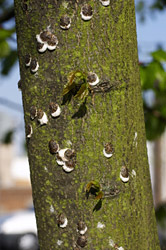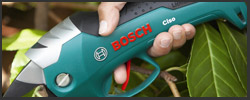YOU ARE HERE Pest Watch > Scale insect control
Pest Watch
Scale insect control
 Scale insect is a garden plant pest problem that can be difficult to control. Gardeners with scale insect problems may need to take measures to control them.
Scale insect is a garden plant pest problem that can be difficult to control. Gardeners with scale insect problems may need to take measures to control them.
The adult scale insect is often like a dark brown limpet, which attaches itself to the stem and branches of plants. It will attack a wide range of woody plants - including Japanese maples, bay trees, citrus (oranges and lemons), elaeagnus and numerous other trees, shrubs, climbers, houseplants and fruit trees and bushes. It can even attack the leaves; hydrangea scale being the most recognised scale insect pest that does this. Hydrangea scale insect attacks have been very bad in recent years.
The adult scale insects can be difficult to control, because the scale covering protects it from predators and is impervious to contact insecticides. Such insecticides may give better control to soft scale or young stages in the lifecycle.
In spring and summer, the adults breed and the females produce a white, almost cotton wool-like substance, which are the eggs or egg mass, containing between 500 and 2,000 eggs, and then die. The eggs hatch to produce a crawler stage, which settles on a suitable part of the plant, starts to feed and becomes immobile.
The length of the lifecycle depends on temperature, but it normally takes around 10 weeks from egg to adult.
Scale insects are sap suckers and a large infestation can weaken plants - especially small or stressed ones. They excrete honeydew, an almost pure sugar solution, on which black sooty mould will grow, causing the leaves of the plant to turn black.
Scale insect control
If possible, start by carefully scraping off as many of the scale insects and their egg masses as possible. I use a plastic plant label and scrape them into some kitchen towel, which I then destroy.
I then wipe the affected areas with more paper towel to remove further eggs.
Then follow up this physical control method by spraying the affected areas and as much of the trunk and foliage as possible with a suitable insecticide, such as Provanto Smart Bug Killer, Provanto Ultimate Bug Killer, Provanto Ultimate Fruit & Vegetable Bug Killer, Resolva Bug Killer or BugClear Ultra. These will kill any eggs they touch and the adults as they suck the sap. These insecticides will also protect the plants from further attack for around two to four weeks (Provanto Ultimate and Resolva) and up to two months (Provanto Smart BugClear Ultra).
Provanto Smart Bug Killer, Provanto Ultimate Bug Killer, Resolva Bug Killer and BugClear Ultra have approval for use on certain edible plants; the full list is given on the label on the bottle.
Other insecticides, barrier products may give some/limited control of soft scale and young stages of the lifecycle.
Use plant protection products safely. Always read the label and product information before use.
Biological control is available for plants growing in greenhouses or conservatories, using either nematodes or a parasitic wasp (Metaphycus helvolus). These are available from several mail order suppliers.
Keep a close eye on the plant once you notice an attack and deal with any further outbreaks you see as soon as you see them.
If you want to know more, or if you've got a gardening problem you need help with, then send an e-mail to: info@gardenforumhorticulture.co.uk
Problems with slugs & snails, aphids, vine weevil, whitefly or lily beetle?


